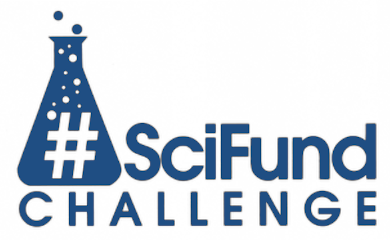Dr. Matthew Hirschey wrote a lengthy critique yesterday of the #SciFund Challenge and of the entire idea of using crowdfunding as a source of research dollars. I am extremely glad that Hirschey has aired his criticism, as his concerns are undoubtedly shared by many scientists. We have an opportunity here to clear the air, so to speak. Let’s take Hirschey’s concerns one by one. I am paraphrasing Hirschey ‘s points in bold, followed by my response.
Raising research money by crowdfunding is an extremely inefficient use of time. I can spend a week writing a traditional grant proposal to raise 50,000 to 500,000 dollars. How does it make sense to spend much more time (a month) to raise much less (a few thousand) through the #SciFund Challenge?
There are a few answers here. First, no scientist begins his or her grant writing career with a half-million dollar proposal. As a graduate student, you start small, applying for dissertation improvement grants, funding to attend conferences, that kind of thing. But writing these smaller grant proposals gives a scientist the experience he or she needs to successfully go after much bigger grants, the kind that can support a whole lab.
It is the same idea with the #SciFund Challenge. We are starting small, with a thousand to few thousand dollar target, because it is a goal that is more easily achieved for beginners. And once participants in the Challenge have learned the skills to crowdfund for a few thousand, the way is wide open to raise more – maybe much more – in this way.
Second, it is absolutely true that a few thousand dollars is not a lot of money for a senior scientist. But if you are a graduate student, money is much tighter and a few extra thousand dollars for your research can make all the difference.
Third, even though participants in the Challenge will be running their crowdfunding campaigns for a month, it will hardly be a full-time occupation during that month. I anticipate that participants will be putting in a total of a few days of time – at most – during the month.
The traditional grant approval process is peer reviewed, which leads to better quality science. Where’s the quality control with crowdfunding?
The obvious danger here is that, without a board of experts standing in the way, anyone with a slick campaign will be able to fool potential donors to funding total nonsense. Additionally, it is indisputably true that the peer review process improves science, both at the grant stage and at the publication stage. Peer review is the beating heart of science and I fully anticipate that, as crowdfunding for research grows, so will a peer review infrastructure to support it. However, this infrastructure will look quite different than the machinery in place to evaluate NSF or NIH grants.
I can imagine a system very similar to what exists in physics right now, where the process of publishing manuscripts has been revolutionized with arXiv.org. It is standard practice for physicists to post their completed manuscripts on this website, long before they see a peer-reviewed journal (if they see a journal at all). Manuscripts aren’t peer reviewed before they show up on arXiv.org (just a light, fast check to look for the equivalent of manuscripts written in crayon). But once manuscripts are posted online, they are heavily scrutinized by other physicists. Peer review happens, in other words, just not in the way that most scientists are used to. Let me repeat, this is already a standard practice in a major field of science.
I can imagine a very similar system for crowdfunding for science, where projects to be funded are posted and review happens after they are posted. Does that infrastructure exist now? No. But I think that it will quickly emerge if science crowdfunding takes off, which is the point of the #SciFund Challenge.
You are encouraging scientists to oversell the benefits of their research, as that is likely to be the only way to succeed with an appeal to a general audience.
The best evidence against this argument is to look at what has actually been happening in the world of science crowdfunding. Biologists Jennifer Culkins and Jennifer Gee have been pioneering the way, being perhaps the first to actually raise cash for their research via crowdfunding. If you look at their campaign page on Kickstarter, where they successfully raised funds for their Elegant Quail research in Mexico, there isn’t any overselling to be found. What you’ll find instead is a wonderful project that combines biology and art in an incredibly compelling way. Culkins and Gee point the way to what will succeed with science crowdfunding, which is innovative thinking. Don’t we want more of that?
Scientists aren’t resistant to engaging with the general public. The perceived gap between the two is because scientists don’t have many opportunities for public outreach.
It is definitely the case that certain ways of engaging with the wider world are becoming less available, such as being interviewed by a science journalist (who are becoming something of an endangered species, as journalism as a whole takes a nosedive). But I don’t believe that an outreach opportunity gap is the main factor keeping scientists away from engaging with the public. For example, every lab has a webpage these days, but what proportion of these sites are accessible and interesting to general audiences? It is a low percentage. How many scientists follow Stephen Jay Gould’s example and write regularly for general interest magazines? Though there are standout exceptions like entomologist Rob Dunn, they remain unfortunately – well – exceptions.
Why are people like Rob Dunn so rare? Ultimately, it is because the incentive structure of professional science strongly rewards papers and grants – and doesn’t reward public outreach.
People become scientists to do science, not write grant proposals. Grant writing already takes too much time and crowdfunding campaigns will suck even more research time away from scientists.
Crowdfunding for science is, ultimately, about a lot more than raising money. It is about connecting people to your research. Jennifer Gee and Jennifer Culkins had 55 backers for their crowdfunding campaign to raise money for the study of the Elegant Quail. You don’t give money to something like this unless you can be convinced to care about it. So, there are now 55 people who are personally invested in Gee and Culkins’ Elegant Quail research. Fifty-five people who will likely follow the twists and turns of Gee and Culkins’ research, by means of a research blog. And these 55 people are surely just the beginning of many more to come. Scientists deeply care about the subjects that they study. Convincing others to care too – isn’t that worth a little of scientists’ time?




A few additional thoughts:
I can imagine a very similar system for crowdfunding for science, where projects to be funded are posted and review happens after they are posted. I like this quite a bit, Jai. A crowdfunding proposal system where people can comment on a given proposal – much like a ye olde friendster of old – would be wonderful. This may not be something for this round, but something to think about in the future.
You are encouraging scientists to oversell the benefits of their research, as that is likely to be the only way to succeed with an appeal to a general audience. I actually think this is a problem – early on. One thing about an established crowdfunding system in which a scientist’s work is public, their reputation is on the line. Publicly. If open review (see above) becomes part of the system, then an oversold grant may well be pilloried. Similarly, if someone promises to cure cancer, but their CV shows that they have no experience beyond brewing tinctures, this will similarly affect the likelihood of one’s funding.
Scientists aren’t resistant to engaging with the general public. The perceived gap between the two is because scientists don’t have many opportunities for public outreach. If anything, this provides an opportunity for outreach build into grants from the get-go. It allows for public buy-in to research projects. If anything, this is an advantage to a crowdfunding framework.
People become scientists to do science, not write grant proposals. Grant writing already takes too much time and crowdfunding campaigns will suck even more research time away from scientists. Like it or not, in our current system we have to fight, and fight hard for money for our science. This indeed takes time and effort – both of which could be spent on doing science. I think the mistake here is to suggest that crowdfunding will always be required *in addition* to a scientist working on traditional avenues of funding. As with all types of funding – from foundations to NGOs to government sources – different projects will be appropriate for different funding sources. Different scientists will also have the skills necessary to better wring-out hard won dollars from different sources. Maybe a Kevin Zelnio can entirely fund his future lab on crowdfunding alone while maybe someone like me is all NSF all the time. Maybe some future grad student love-child of ours will go 50-50, in terms of time and money, from both. The problem of spending more of one’s time on money has to do with how difficult it is to get money. More pots should, if anything, mean less time working on grants, and more time on science, as the total % of projects funded increases with more opportunity. Either that, or we need to think more seriously about our funding structure in general – another conversation for another time.
p.s. To continue on the peer review front, one aspect of the #SciFund challenge that we may not have emphasized enough yet is that participants will all have to review 1-2 other proposals and provide feedback. Participants can then take that feedback and revise before posting their proposal. So, as a part of the #SciFund challenge, there will be some opportunity for critical review.
We love your #SciFund challenge and would welcome hosting it on our crowdfunding site http://peerbackers.com – we have some ideas we’d like to discuss so feel free to reach out! EIther way – good luck with your endeavor!
To prove crowdfunding for science can actually work, you didn’t mention in this post a site that you did mention on other occasions : Cancer Research UK’s My Projects site http://myprojects.cancerresearchuk.org – MyProjects is a site that let people donate for research on specific forms of cancer (breast, bowel,..). They have now reached more than £1 million in funding. This is displacement funding (just like Kiva.org is), but this proves that donors can connect with scientists working on problems they are concerned about.
One of the great promises crowdfunding is offering is opening up the funnel. Either by allowing young scientists with fresh views to test their ideas; or by letting more established scientists, that could potentially access larger grants, really throw the ball out of the field. Concerning medical research, where most of the science is funded by governmental organizations (like NIH in the US or NHS in the UK) and big pharmaceutical companies, there is a clear urge from the patients to accelerate research and look for novel insights to address their needs.